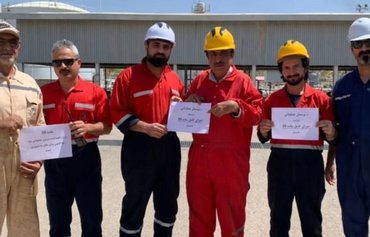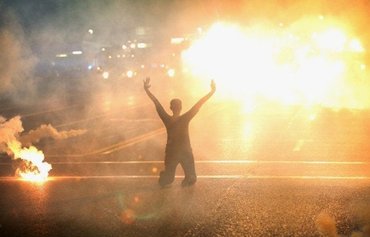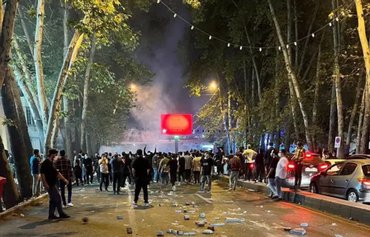As they assembled on September 3 to protest poor working conditions and low wages in front of the Ministry of Oil building in Tehran, 67 employees of Iran's South Pars Gas Co. were arrested.
The South Pars employees had announced their plans to protest in advance, travelling into Tehran from different cities, mostly in the south of the country.
A number of other oil sector employees joined them in the Iranian capital.
The gathering was intended to be a continuation of an August 11 demonstration, during which employees called for the implementation of a dormant section of the Petroleum Act of Iran (Article 123, Section 10).
![Iranian oil and gas sector employees hold signs reading 'Section 10 is our legal right,' in February, demanding that the government implement legislation passed in 2014 and raise their salaries. [Iran International]](/cnmi_di/images/2022/09/19/37187-Iran-oil-protest-600_384.jpg)
Iranian oil and gas sector employees hold signs reading 'Section 10 is our legal right,' in February, demanding that the government implement legislation passed in 2014 and raise their salaries. [Iran International]
![Teachers protest in Fars province, Iran last October. Teachers, retirees and workers of various sectors have been steadily protesting low pay and insufficient benefits. [Farsnews.ir]](/cnmi_di/images/2022/09/19/37188-Iran-teachers-protests-600_384.jpg)
Teachers protest in Fars province, Iran last October. Teachers, retirees and workers of various sectors have been steadily protesting low pay and insufficient benefits. [Farsnews.ir]
Section 10, approved by the Majles (Iranian parliament) in 2014, focuses on raising base salaries for oil and gas sector employees.
But the government has not implemented it.
When oil sector employees reached the ministry on September 3, they were met by the regime's security forces, who prohibited them from protesting.
Regime forces arrested 67 of them, and confiscated their mobile phones.
In recent months, a large number of Iranian oil and gas sector workers have been steadily protesting against unfavourable working conditions, low salaries and insufficient benefits.
Until this year, most protests were organised by contracted oil and gas sector workers who spoke out against their difficult work conditions and low pay, demanding staff positions or permanent contracts.
On August 11, groups of employees from multiple oil service companies and refineries protested unsatisfactory work conditions that have remained unchanged over the past eight years.
They demanded increases in their salaries and pensions, reduction of taxes, improvement in their health insurance plans, and necessary repairs to worn-out oil and gas facilities.
In response to the workers' demands, the administration of President Ebrahim Raisi has stated that Section 10 "permits" the government to implement its provisions, and does not "mandate" the government to do so.
After their arrest in Tehran, South Pars employees were forced to sign pre-written commitments, reportedly vowing not to continue their protest.
Hard line against protesters
Employees of other sectors also are facing economic hardship as the Iranian economy falters -- a state of affairs many blame on the regime, citing its pursuit of a regional, expansionist agenda, at the expense of the Iranian people.
For months, government retirees and workers of different sectors have gathered in protest across the country to demand better working conditions and benefits and higher salaries to meet inflation.
But instead of listening to the demands of protesting workers and attempting to improve their conditions, the Iranian regime has adopted a hard line against them, sending its security apparatus to crack down on protests.
Teachers, factory workers and environmentalists calling for positive change in Iran have been intimidated, arrested and beaten by anti-riot police forces and plainclothes and uniformed Islamic Revolutionary Guard Corps (IRGC) elements.
In the oil sector, some employees say they have not received their salaries on time and are facing a hike in income tax. A group of them protested in front of Abadan's Oil Products Refinery on August 13.
They called on the Raisi administration to be more attentive to their living conditions, to identify and prosecute plunderers in the oil and gas sector, and to remove bonus ceilings from retirees' pensions.
They also called for the repair of dilapidated facilities and demanded an end to political appointments in the oil industry.
Plundering public wealth
Under Raisi, political appointments have become the new normal in Iranian ministries, where regardless of expertise, former officials or members of the IRGC are increasingly taking over senior positions.
The majority of contracting and sub-contracting oil service companies are affiliated with the IRGC, whose connections to the Ministry of Oil ensure lucrative contracts that come out of the public purse -- funded by Iranian taxpayers.
Most Ministry of Oil contracts with the private sector are likewise handed to IRGC-owned or -affiliated companies, which reap benefits, launder money and evade sanctions, even as the public withers under major economic pressure.
Over the past three years, an Iran-based petrochemical engineer and chief financial officer of a private oil company told Al-Mashareq, his company has been steadily losing bids to IRGC-affiliated companies in Ahvaz and Asaluyeh.
"Unless you are a former or current IRGC member, or have close ties to the IRGC, you will likely not win oil contracts in this country," he said, asking that his name not be used.
Meanwhile, the Iranian regime has continued to directly or indirectly participate in illicit oil smuggling and transfers, acts of piracy and money laundering operations, often using front companies to evade sanctions.
It has engaged in deceptive shipping practices, and has continued to threaten oil vessels in the Strait of Hormuz with acts of piracy.
In May, an international oil smuggling and money laundering network led by IRGC Quds Force (IRGC-QF) officials was slapped with US sanctions.
The network, supported by the Russian government and state-run economic organisations, has facilitated the sale of hundreds of millions of dollars' worth of Iranian oil to profit the IRGC-QF and Lebanese Hizbullah, the US Treasury said.
It "has acted as a critical element of Iran's oil revenue generation, as well as its support for proxy militant groups that continue to perpetuate conflict and suffering throughout the region", it said in a statement.

![Iranian gas and oil sector employees last November protest low salaries, the dormant Section 10 legislation of Iran's Oil Law, and the government's unfulfilled promises. [Iran International]](/cnmi_di/images/2022/09/19/37186-Iran-oil-protest-600_384.jpg)






